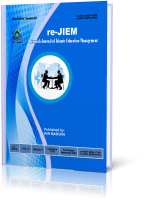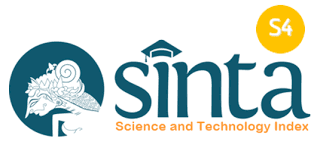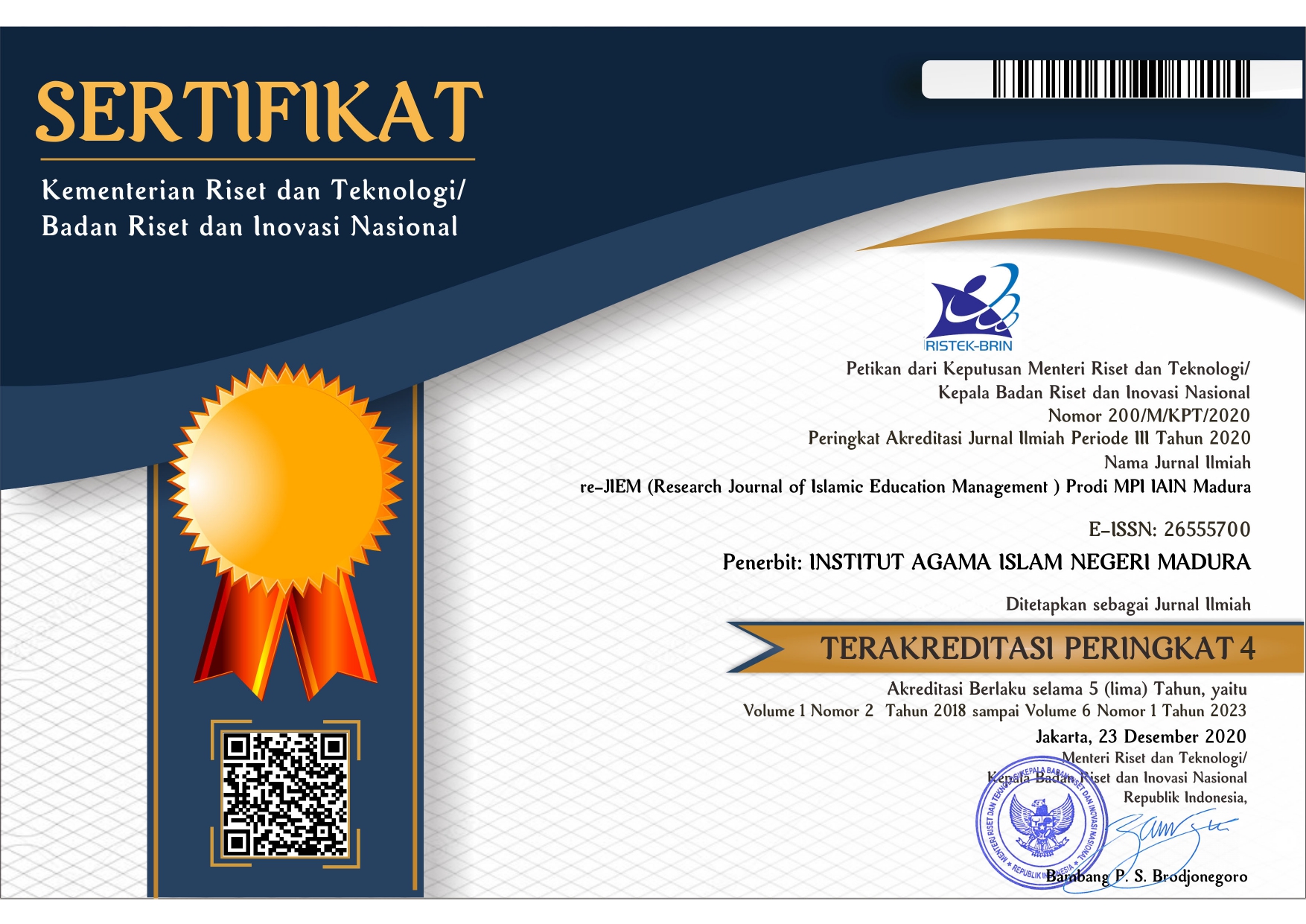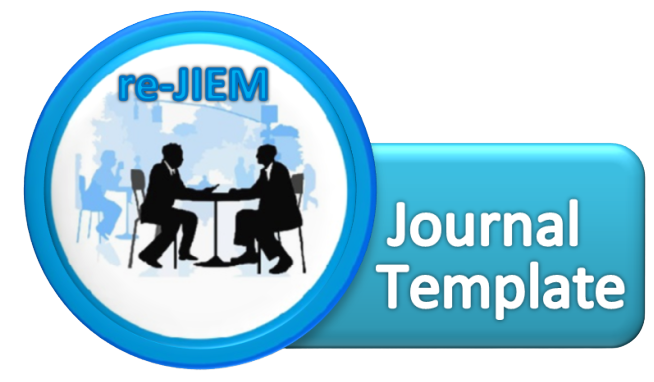PENGEMBANGAN KEPROFESIAN BERKELANJUTAN GURU BAHASA MADURA MELALUI DIKLAT BAHASA DAN SASTRA MADURA DI PAMEKASAN
 Abstract views: 276
,
Abstract views: 276
,
 PDF downloads: 178
PDF downloads: 178
Abstract
Continuous professional development is the effort made by teachers to enhance their professionalism through established standards and the advancement of knowledge, technology, and art. The research aims to understand the management of training programs and identify the supporting and inhibiting factors of these training activities. The research adopts a descriptive-qualitative approach. Data collection techniques include interviews, observations, and documentation. Data analysis involves data reduction, data presentation, and conclusion. The research result on planning, committee formation, vision, mission, objectives, empowerment of members to become training facilitators, and collaboration with cultural experts. Organizing involves assigning tasks to eight members based on their competencies. In implementation, the training attracts Madurese language teachers from all levels, from elementary to high school, through collaboration with various parties and is conducted annually. Identified evaluations include planning, certificate issuance services, and time effectiveness. Supporting factors relate to the educational background and competency of members, the possession of laptops by all members, involvement in multiple organizations for easy information sharing, clear work programs, and adequate facilities and infrastructure. Meanwhile, inhibiting factors include stagnant grant assistance, insufficient publication techniques, and the lack of community concern for the importance of preserving local cultural heritage, especially the Madurese
Downloads
References
Arifin, Zainal. Evaluasi Program Teori Dan Praktek Dalam Konteks Pendidikan Dan Nonpendidikan. Bandung: Remaja Rosdakarya, 2019.
Aziz, Abdul. Pengantar Manajemen Dan Substansi Administrasi Pendidikan. Jember: Pustaka Radja, 2017.
Dudung, Agus. “Pelatihan Pengembangan Keprofesian Berkelanjutan (Pkb) Bagi Guru - Guru Se Jakarta Timur.” Sarwahita 11, no. 1 (2014): 13. https://doi.org/10.21009/sarwahita.111.03.
Elbandiansyah. Pengantar Manajemen. Yogyakarta: Deepublish, 2023.
Helmayunita, Nayang, Dian Fitria Handayani, Vanica Serly, Aimatul Yumna, and Herlina Helmy. “Pengembangan Keprofesian Berkelanjutan Guru Melalui Pelatihan Penyusunan Laporan Penelitian Tindakan Kelas.” Abdimas Unwahas 7, no. 1 (2022): 65–71. https://doi.org/10.31942/abd.v7i1.6564.
Magdalena, Ina, Nurul Hidayati, Ratri Hersita Dewi, Sabgi Wulan Septiara, and Zahra Maulida. “Pentingnya Evaluasi Dalam Proses Pembelajaran Dan Akibat Memanipulasinya.” Masaliq 3, no. 5 (2023): 810–23. https://doi.org/10.58578/masaliq.v3i5.1379.
Mayasari, Nanny, Moh Arifin, Purnomo Dumiyati, Margiyono Suyitno, Nurul Hikmah, Arjuna Mega, Zulfy Lestari, et al. “Perencanaan Pendidikan,” 199. Banten: PT. Sada Kurnia Pustaka, 2022.
Mubah, Hilmi Qosim. “PSIKOMANAJERIAL PERSONALIA PENDIDIKAN; MENGKONSTRUKSI PRODUKTIFITAS KERJA PERSPREKTIF IDENTIFIKASI KEMATANGAN PERSONAL.” AL-FIKRAH: Jurnal Studi Ilmu Pendidikan Dan Keislaman 2, no. 2 (2019). https://www.jurnal.alhamidiyah.ac.id/index.php/al-fikrah/article/view/57.
Muhammad, Darsa. “Implementasi Fungsi Actuating (Penggerakan/ Pelaksanaan) Dalam Manajemen Program Bahasa Arab Di MI Manarul Islam Malang.” Mahira 2, no. 1 (2022): 13–32. https://doi.org/10.55380/mahira.v2i1.194.
N., Yusup Yesse Vena, and Ambar Teguh Sulistiyani. “Pengembangan Sumber Daya Manusia Aparatur Melalui Pendidikan Dan Pelatihan Berbasis Kompetensi Di Balai Diklat Industri Regional IV Yogyakarta.” Universitas Gadjah Mada Yogyakarta, 2013. https://etd.repository.ugm.ac.id/penelitian/detail/66775.
Nurjannah, Siti, and Ali Nurhadi. “Relevansi Tujuan Dan Materi Dalam Program Pendidikan Dan Pelatihan Pengembangan Guru PAI Di Era Digital.” Indonesian Jurnal of Islamic Education Management 3, no. 2 (2020): 96–107.
Organisasi, Perubahan, Pendidikan Tinggi, Kesehatan Oleh, : Nang, and Randu Utama. “Faktor Pendukung Dan Penghambat Dalam Proses.” Jurnal Pendidikan 18, no. c (2017): 32–43.
Qamariyah, Nurul, and Ali Nurhadi. “Pentingnya Analisis Kebutuhan Dalam Program Pendidikan Dan Pelatihan Berbasis IT Bagi Guru PAI Di Tengah Pandemi Covid’19.” Indonesian Journal of Islamic Educational Management 4, no. 1 (2021): 7–15. https://doi.org/10.24014/ijiem.v4i1.11647.
Rahayu, Dwi Agustina, Faqih Al Mangsur, and Aprin Ana Anggia. “Sosialisasi Pengenalan Seni Budaya Lokal Kepada Masyarakat Desa Boyolangu Melalui Digitalisasi Untuk Meningkatkan Nasionalisme.” Jurnal Abdi Masyarakat Indonesia 2, no. 6 (2022): 1945–52. https://doi.org/10.54082/jamsi.563.
Rahman, Noer, and Zaenal Fanani. Pengantar Manajemen Pendidikan; Konsep Dan Aplikasi Fungsi Manajemen Pendidikan Perspektif Islam. Malang: Madani, 2017.
Saefrudin. “Pengorganisasian Dalam Manajemen.” Dirasah : Jurnal Studi Ilmu Dan Manajemen Pendidikan Islam 1, no. 1 (2018): 1–16.
Shalahudin. “Did Transformational and Transactional Leadership Style of Head Master Influence High School Teacher Performance?” Psychology and Education Journal 58, no. 1 (2021): 2320–28. http://psychologyandeducation.net/pae/index.php/pae/article/view/1108.
Suadi. “Evaluasi Dan Pengendalian Strategi Organisasi.” TARBAWI : Jurnal Studi Pendidikan Islami 9, no. 1 (2021).
Thoha, Mohammad, and Hilmi Qosim Mubah. “Re-Design Manajemen Pendidikan Anak Usia Dini Berbasis Emotional Quotient.” KIDDO: Jurnal Pendidikan Islam Anak Usia Dini 4, no. 2 (2023): 13–28. https://doi.org/10.19105/kiddo.v4i2.10200.
Ulinafiah, Diyasika, and Novan Ardy Wiyani. “Penciptaan Layanan Prima Melalui Penerapan Sistem Informasi Manajemen Di Perpustakaan Iain Purwokerto.” Re-JIEM (Research Journal of Islamic Education Management) 2, no. 2 (2019): 223. https://doi.org/10.19105/re-jiem.v2i2.2663.
Wahira. “Pengembangan Model Pelatihan Apresiasi Seni Tari Tradisi Lokal Pada Guru Di Sekolah Dasar.” Jurnal Penelitian Pendidikan 29 (2011): 149–57.
Wakiah, Maryatul, and Jamiludin Usman. “Manajemen Peningkatan Mutu Kompetensi Lulusan Bidang Kewirausahaan Dalam Memenuhi Standar Nasional Pendidikan Di Smk Annuqoyyah Guluk-Guluk Sumenep Jawa Timur.” Re-JIEM (Research Journal of Islamic Education Management) 3, no. 1 (2020): 71. https://doi.org/10.19105/re-jiem.v3i1.3517.
Copyright (c) 2023 Eva Zakiyatul Fakhiroh, Ali Nurhadi, Atiqullah, Zainatul Mufarrikoh

This work is licensed under a Creative Commons Attribution-ShareAlike 4.0 International License.
Authors who publish with this journal agree to the following terms:
Authors retain copyright and grant the journal right of first publication with the work simultaneously licensed under a Creative Commons Attribution-ShareAlike 4.0 International License that allows others to copy and redistribute the material in any medium or format with an acknowledgment of the work's authorship and initial publication in this journal and also allows to remix, transform, and build upon the material for any purpose, even commercially with contributions under the same license as the original.
Authors are able to enter into separate, additional contractual arrangements for the non-exclusive distribution of the journal's published version of the work (e.g., post it to an institutional repository or publish it in a book), with an acknowledgment of its initial publication in this journal.
Authors are permitted and encouraged to post their work online (e.g., in institutional repositories or on their website) prior to and during the submission process, as it can lead to productive exchanges, as well as earlier and greater citation of published work.



























